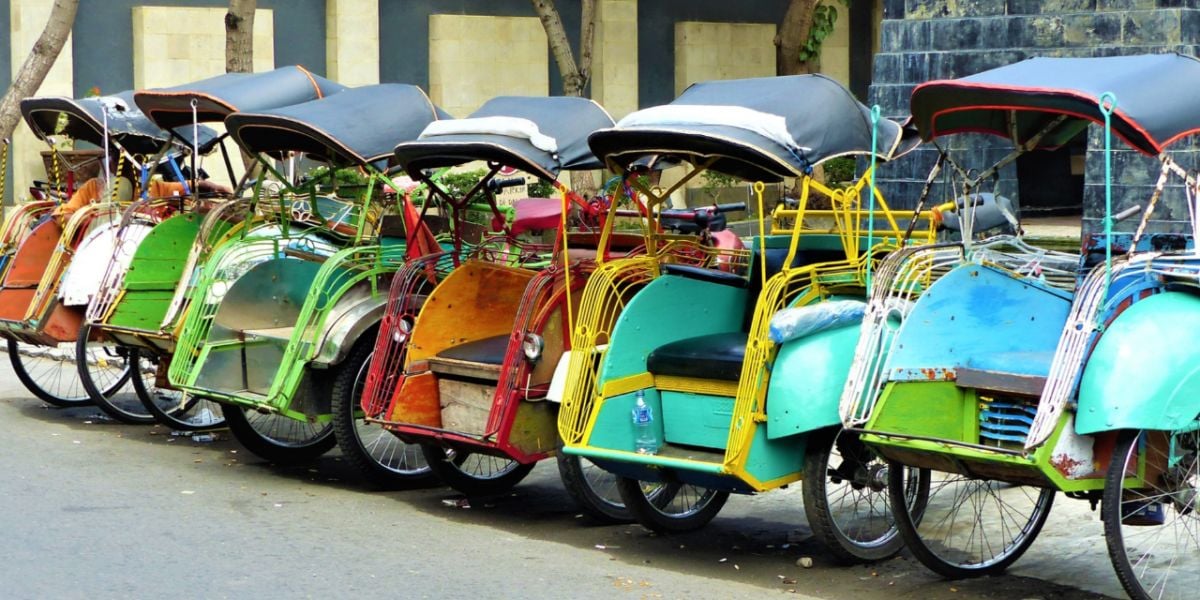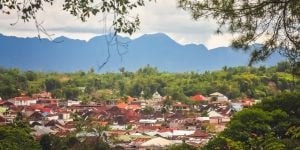
For longer trips, domestic flights from most major cities are usually quite affordable, but if you prefer to stay on land, a boat can be a convenient way to get from one island to another.
There are numerous modes of transport in Indonesia. Official cabs are readily available in major cities, as is the dokar, a two-wheeled horse-drawn cart, which can be used throughout the archipelago. In any case, the mode of transportation you choose will vary according to your place of departure, your destination, your budget and time constraints. Some are undoubtedly more comfortable, faster, but more expensive than others.
Remember that traffic can become heavy in some of Indonesia's major cities, especially in Jakarta and Bali. Traffic jams are even heavier during certain celebrations, so it is best to make arrangements in advance. For example, it is customary for Indonesian Muslims to return to their home village or town to celebrate Eid (the end of Ramadan). On this occasion, it is not uncommon for millions of vehicles to be stuck on the roads for more than 10 or 15 hours. You have been warned!
Read also Culture in Indonesia
Check out some of the most popular means of transportation in Indonesia hereafter:
Traveling by Ojek in Indonesia
Ojeks are motorcycle cabs used to transport passengers. You'll find them around most terminals and major sites, as well as at intersections. Because of their size, they can easily weave their way through Jakarta traffic. They are especially popular in Bali.
Important:
Always discuss the trip's price before your departure. Alternatively, the Go-Jek mobile app allows you to order an ojek in major cities at a reasonable price.
Traveling by Bemo in Indonesia
The bemo (sometimes called angkot, taksi, opelet, mikrolet, angkude or pete-pete depending on the region) is a van or minibus where the seats have been replaced by benches. The seats can be rather cramped, especially since drivers tend to fill their vehicles to the maximum before leaving.
Most bemos operate along regular routes, but they can pick up and drop off travelers at any point along the way.
Due to their size and mode of operation, bemos are relatively cheap and small enough to navigate through narrow roads. However, choose this mode of transportation only if you have a very small budget, as drivers are known to try to raise fares when dealing with foreign passengers. To avoid unpleasant surprises, it is a good idea to ask for the exact fare from a reliable source or try to see what other passengers are paying.
Traveling by Becak in Indonesia
The becak is traditionally a three-wheeled bicycle with a passenger seat in front. It is an upgrade of the old-fashioned rickshaw, pulled by hand. Like the clove cigarette or the wayang kulit puppet, the becak is a symbol of Indonesia. The styles can vary from city to city, and nowadays there are motorized becaks, rather noisy, but cheap to get around.
Becaks are not allowed on the main streets of some major cities, but they are very well suited for getting around in narrow streets. Make sure you agree on a price with the driver before you get in. If there are two passengers, make sure you agree on a price that includes both.
Traveling by Bajaj in Indonesia
A bajaj is a motorized rickshaw or tuk-tuk capable of carrying up to five passengers, subject to the size and amount of luggage. It used to be an extremely popular means of transportation in Jakarta, but their number has drastically decreased.
Nowadays, some bajajs run on natural gas or on electric power, which makes them more environmentally friendly and less noisy than the traditional diesel-powered version.
Traveling by by Dokar and river cab in Indonesia
The Dokar is becoming more and more difficult to find. It is, in fact, a horse-drawn carriage, a traditional mode of transport in Jakarta. These days, the dokar is mostly used to move goods between markets.
Back in the days before the bajaj, becak and ojek became popular, Jakartans used to travel along the many canals and rivers by boat. Nowadays, there are still a few perahu penyeberangan (river cabs), but these are mainly used to cross the river from a main road to the villages on the other side.
Traveling by bus in Indonesia
Beyond Java and Bali, buses are not a very popular means of transportation in the city.
Nevertheless, Jakarta boasts a relatively extensive, affordable bus system. On board, however, be very careful of pickpockets.
Read also Getting around Jakarta
Getting a cab in Indonesia
Cabs are an affordable and convenient way to get around Indonesia. But in any case, it is best to avoid rush hour. Try to grab a metered taxi, though. You should have no trouble finding one, as there are many in major cities. Make sure the meter is on; otherwise agreed on a price before you leave.
Bluebird Taxis provides services in major cities and tourist areas. The drivers use a meter and can usually communicate in English. In addition, the company has a mobile application designed to easily order a taxi.
Grab Car is the Southeast Asian version of Uber, but at more affordable rates.
Uber-like apps in Indonesia
Uber used to operate in Indonesia, but the transportation startup has ceased its activities in most of Southeast Asia since 2018, following the signing of a partnership agreement with its competitor Grab. Nowadays, only Grab and Go-Jek remain on the market in Indonesia. But since Go-Jek is a local company, Grab has a harder time establishing a lasting presence in the country than elsewhere in the region, as Indonesians tend to better support local
entrepreneurs. In addition, cab drivers are very critical of this competition and have generally taken over airports and hotels.
Renting a car or motorcycle in Indonesia
In Indonesia, for more autonomy and flexibility, you can rent or buy your own car or motorcycle. You can even rent a motorcycle on a short-term basis, and on islands like Bali, it is easy to rent from the numerous rental agencies that specifically cater to expatriates.
If you plan to rent for a longer term, then be sure to negotiate the harga terbaik (best price). The longer the rental, the lower the rate. Make sure a helmet is included and that the compartment under the seat locks securely.
Otherwise, you can simply rent a car in Indonesia and a driver for a day or even for a longer period. This alternative can be especially useful if you have never tried driving in Indonesia before and when looking for accommodation in Indonesia. Renting a car and driver does not cost more than renting a car alone.
Useful links:
We do our best to provide accurate and up to date information. However, if you have noticed any inaccuracies in this article, please let us know in the comments section below.








